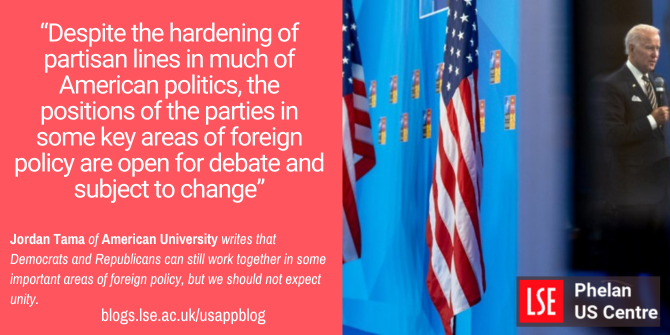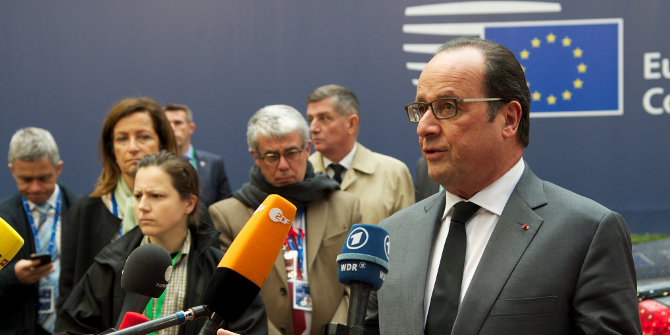 Polarization now influences all aspects of American politics, and foreign policy is no exception, with splits between Republicans and Democrats over issues such as climate change and immigration. In a new book, Jordan Tama shows that despite growing polarization, and intra-party differences over the Russia-Ukraine war and Israel policy, Democrats and Republicans have still been able to cooperate on issues such as China, NATO, and trade.
Polarization now influences all aspects of American politics, and foreign policy is no exception, with splits between Republicans and Democrats over issues such as climate change and immigration. In a new book, Jordan Tama shows that despite growing polarization, and intra-party differences over the Russia-Ukraine war and Israel policy, Democrats and Republicans have still been able to cooperate on issues such as China, NATO, and trade.
If there’s one thing that everyone can agree on, it’s that partisan division dominates Washington DC. As New York Times analyst Ezra Klein has written, polarization is the “master story” of contemporary American politics. Georgetown University Professor Charles Kupchan and LSE Phelan US Centre Director Peter Trubowitz have shown that this polarization has infected US foreign policy, ending a long-standing bipartisan compact in support of liberal internationalism.
Bipartisan coalitions on foreign policy
Yet the collapse of this bipartisan compact has not meant the end of foreign policy bipartisanship. In my new book, Bipartisanship and US Foreign Policy: Cooperation in a Polarized Age, I show that Democrats and Republicans still work together on many foreign policy issues, even as bipartisan consensus in support of liberal internationalism has faded away. In recent years, bipartisan coalitions have shaped US policy on issues including China, NATO, and trade.
Importantly, though, bipartisanship today often coexists with intra-party division, as internationalists battle over policy with more inward-looking members of their own party. As a result, most US foreign policy debates today are neither entirely in agreement nor entirely polarized, but rather involve a variety of political constellations. This mixed landscape offers continued opportunities to forge bipartisan coalitions but makes it difficult for the United States to speak with one voice on the world stage.
To be sure, some important US foreign policy debates are strongly polarized. For instance, Democrats are far more supportive than Republicans of governmental action to address climate change, while Republicans are far more supportive than Democrats of tight restrictions on immigration. The two parties are also often sharply split over multilateral diplomacy, as evidenced by Donald Trump’s withdrawal as president from several major agreements negotiated by Barack Obama.
Cooperation on China, NATO, and trade
Many other issues, however, feature some degree of cooperation between Democrats and Republicans. On China, most members of both parties advocate a hawkish stance reminiscent of US policy toward the Soviet Union during the Cold War. There has been more continuity than change in China policy from the Trump to the Biden presidency, with differences between the two administrations mainly involving emphasis and style more than policy substance. Similarly, Democrats and Republicans in Congress have cooperated to enact an array of laws designed to limit Chinese influence in Asia and enhance America’s competitiveness vis-à-vis China. Some progressive members of Congress are calling for a less conflictual stance toward China, but these voices are largely being drowned out in today’s Washington.
Bipartisanship also remains strong on US policy toward NATO. Although former President Trump has questioned the value of NATO and considered leaving the alliance, most Democrats and Republicans continue to support it. In 2022, the US Senate approved the addition of Sweden and Finland to NATO by a vote of 95-1. In December last year, in an effort to prevent Trump from exiting NATO if he returns to the presidency, Congress passed a measure introduced by Democratic Senator Tim Kaine and Republican Senator Marco Rubio that prohibits the United States from withdrawing from the alliance without congressional approval.
Many Democrats and Republicans are largely on the same page on trade policy today too. However, this page comes from a protectionist, rather than liberal internationalist, playbook, as members of both parties are promoting industrial reshoring and other steps designed to bolster America’s manufacturing base and insulate the United States from supply chain vulnerabilities. These steps include a landmark $50 billion investment by the US government in domestic semiconductor production.

“P20220630AS-0997″ by The White House is United States government work
Divisions over Russia-Ukraine war and Israel policy
In still other debates, cooperation across the aisle is paired with intense intra-party division. On the Russia-Ukraine war, internationalist Republicans, including Senate Minority Leader Mitch McConnell and presidential candidate Nikki Haley, are aligned with the Biden administration and congressional Democrats in favoring a new round of military aid to Ukraine. But the MAGA wing of the GOP, led by Trump, is strongly opposing any further assistance to the embattled country. This intra-party GOP division over Ukraine policy reflects a broader ongoing debate within the party between proponents of Ronald Reagan’s brand of hawkish internationalism and advocates of Trump’s America First philosophy – a debate that remains remarkably vibrant despite Trump’s domination of the GOP in many other ways.
On Israel policy, meanwhile, the principal political fault line lies within the Democratic Party. Following Hamas’s October 7 attack on Israel, the Biden administration and most members of Congress in both parties endorsed Israel’s right to use military force against Hamas and backed increased US aid to Israel. But a growing contingent of progressive Democrats has strongly criticized Israel for using force excessively and urged both a cease-fire and an end to US military aid to America’s longtime partner. This intra-party Democratic debate includes a strong generational component, as younger Democrats are less pro-Israel than are older Democrats. The split also reflects a broader generational divergence over foreign policy among Democrats, as Millennials and members of Generation Z are less supportive than prior generations of international engagement and of military approaches to overseas problems generally.
The Ukraine and Israel cases suggest that, despite the hardening of partisan lines in much of American politics, the positions of the parties in some key areas of foreign policy are open for debate and subject to change. This fluidity can foster needed rethinking and open the door to the creation of new bipartisan coalitions, but it also can make it harder to forge consensus and can create greater uncertainty abroad about the reliability of US commitments. Looking ahead, groups of Democrats and Republicans are likely to continue to be able to forge coalitions on a variety of foreign policy issues, but a new bipartisan compact on America’s role in the world is unlikely to be in the cards.
Listen to a Ballpark Extra Inning podcast with the author
- Please read our comments policy before commenting.
- Note: This article gives the views of the author, and not the position of USAPP – American Politics and Policy, nor the London School of Economics.
- Shortened URL for this post: https://bit.ly/48rau2h






